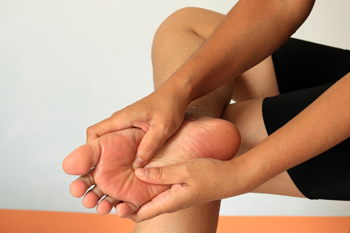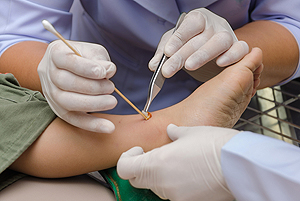Neuropathy, or nerve damage, is a condition many people with diabetes also suffer from. Heightened levels of sugar in the bloodstream due to diabetes can cause impaired nerve and blood vessel functionality. Peripheral neuropathy—the most common form of neuropathy in diabetics—affects the feet and legs. It can damage blood vessels’ ability to provide nutrients and oxygen to nerves in the feet and also reduce the signals those nerves send to the brain. Symptoms of peripheral neuropathy may include a burning sensation—or numbness, tingling, tightness or sharp pains—in the feet. Excessive sweating or a heaviness in the legs or arms may also occur. Diabetic patients may help reduce or prevent nerve damage by controlling blood sugar levels, reducing blood pressure, refraining from smoking or drinking alcohol, and losing weight. If you have diabetes, it is suggested that you contact a podiatrist to help manage the impact this disease can have on your feet.
Neuropathy
Neuropathy can be a potentially serious condition, especially if it is left undiagnosed. If you have any concerns that you may be experiencing nerve loss in your feet, consult with one of our podiatrists from Canonsburg Podiatry Associates. Our doctors will assess your condition and provide you with quality foot and ankle treatment for neuropathy.
What Is Neuropathy?
Neuropathy is a condition that leads to damage to the nerves in the body. Peripheral neuropathy, or neuropathy that affects your peripheral nervous system, usually occurs in the feet. Neuropathy can be triggered by a number of different causes. Such causes include diabetes, infections, cancers, disorders, and toxic substances.
Symptoms of Neuropathy Include:
- Numbness
- Sensation loss
- Prickling and tingling sensations
- Throbbing, freezing, burning pains
- Muscle weakness
Those with diabetes are at serious risk due to being unable to feel an ulcer on their feet. Diabetics usually also suffer from poor blood circulation. This can lead to the wound not healing, infections occurring, and the limb may have to be amputated.
Treatment
To treat neuropathy in the foot, podiatrists will first diagnose the cause of the neuropathy. Figuring out the underlying cause of the neuropathy will allow the podiatrist to prescribe the best treatment, whether it be caused by diabetes, toxic substance exposure, infection, etc. If the nerve has not died, then it’s possible that sensation may be able to return to the foot.
Pain medication may be issued for pain. Electrical nerve stimulation can be used to stimulate nerves. If the neuropathy is caused from pressure on the nerves, then surgery may be necessary.
If you have any questions, please feel free to contact our office located in Canonsburg and McMurray, PA . We offer the newest diagnostic and treatment technologies for all your foot care needs.





